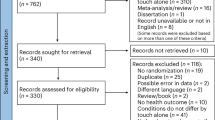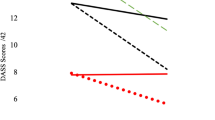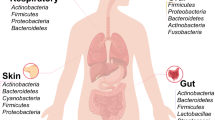Abstract
Data sources MEDLINE and bibliographies of identified studies.
Study selection Primary clinical trials were selected if they included human subjects and assessed effects on plaque levels using Turesky modification of Quigley–Hein index1 or gingivitis using the Löe and Stillness index.2
Data extraction and synthesis A range of study characteristics were analysed together with plaque and gingivitis scores as the main outcome measure. Meta-analysis was conducted using a random effects model.
Results A total of 19 studies were included. A statistically significant reduction in plaque levels was found after rinsing in ‘1-day’ studies but not in postbrushing measures. In longitudinal studies, there were again statistically significant reductions in plaque levels and gingivitis.
Conclusions PLAX (Pfizer, Sandwich, Kent, UK) appears to have some benefit in plaque and gingivitis reduction but the clinical effect and benefit is likely to be small.
Similar content being viewed by others
Commentary
When assessing the efficacy of mouthwashes there are usually two outcome measures used, either the reduction in levels of plaque or in clinical effects such as gingivitis and periodontitis. This meta-analysis examined both the levels of plaque and gingivitis.
The study was well-designed, evaluating a number of issues that should be considered in a systematic review, such as setting clear inclusion criteria and using quality assessments of the selected studies. In contrast with a systematic review, however, the authors did not include studies that were not published in English, did not seem to assess subjects who dropped out of the studies and used only one database for their search (MEDLINE).
Assessing quantitative plaque levels with indices has limitations. This is not to say that clinical measurements are not affected by limitations either: what they have in common is a subjective interpretation of quantities on a sliding scale. The authors chose the use of the Turesky modification of the Quigley–Hein plaque index1 for plaque assessment and the Löe and Silness gingival index2 as inclusion criteria. These indices both suffer from such limitations, which may lead to bias.
Owing to the number of different follow-up times, different meta-analyses were carried out to match the data from different studies using the same time intervals. There were a number of variables between the studies, ie, brushing times, or some studies used toothpastes and others did not, resulting in some heterogeneities.
The stated aim of this study was to assess the effectiveness of PLAX (Pfizer) as an adjunct to oral hygiene and oral health maintenance. The ‘1-day’ data showed no benefit of PLAX when toothpaste was used with brushing. Three studies were included for 12- and 24-week data on gingivitis, which did reveal a statistically significant benefit for the mouth-wash. A further two studies using triclosan also revealed a benefit that was statistically significant. These five studies had brushing times of either 30 s only or the brushing times were not recorded. Interestingly, the majority of these five studies were sponsored by PLAX-supporting companies. The actual clinical effect as a true adjunct, therefore, is not conclusive. The authors rightly stated, therefore, that the benefit on oral health is likely to be very small.
Practice point
-
The clinical benefit of a PLAX pre-brushing rinse is limited.
References
Turesky S, Gilmore N, Glickman I . Reduced plaque formation by the chloromethyl analogue of victamine C. J Periodontol 1970; 41:41–43.
Löe H, Silness J . Periodontal disease in pregnancy. Acta Odontol Scand 1963; 21:533–551.
Author information
Authors and Affiliations
Additional information
Address for Correspondence: IF Angelillo, Department of Hygiene, Medical School, University of Cantanzaro ‘Magna Gracia’, Via Tommaso Campanella, 88100 Cantanzaro, Italy. E-mail: angelillo@unicz.it
Angelillo IF, Nobile CGA, Pavia M. Evaluation of the effectiveness of a pre-brushing rinse in plaque removal: a meta-analysis. J Clin Periodontol 2002; 29:301–309
Rights and permissions
About this article
Cite this article
Tucker, R. A PLAX prebrushing rinse shows some effect but clinical value may be small. Evid Based Dent 4, 25 (2003). https://doi.org/10.1038/sj.ebd.6400169
Published:
Issue Date:
DOI: https://doi.org/10.1038/sj.ebd.6400169



